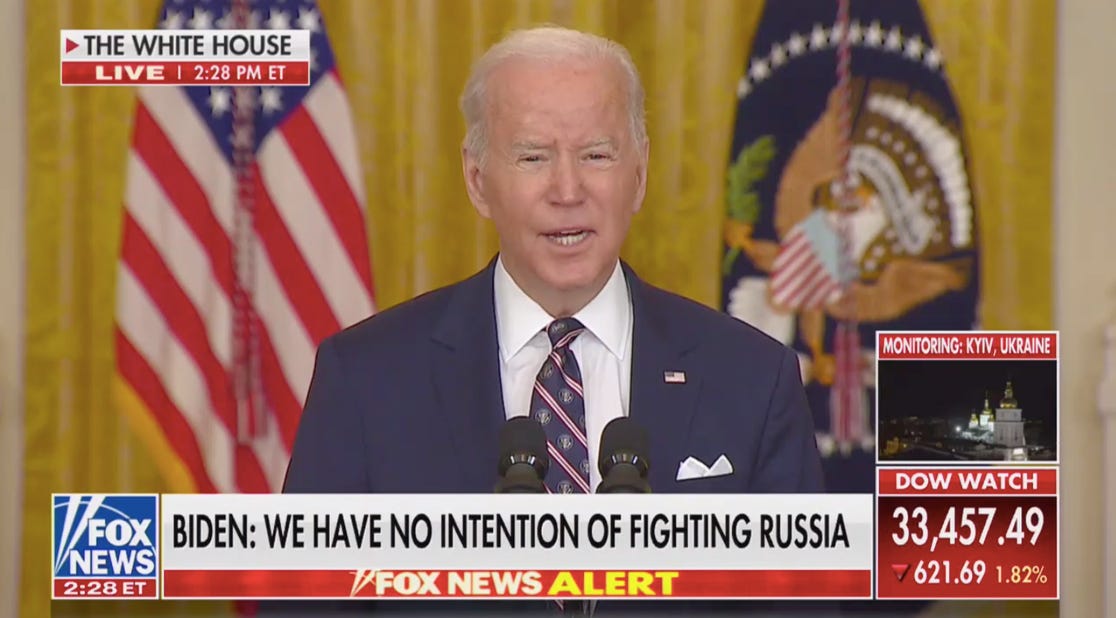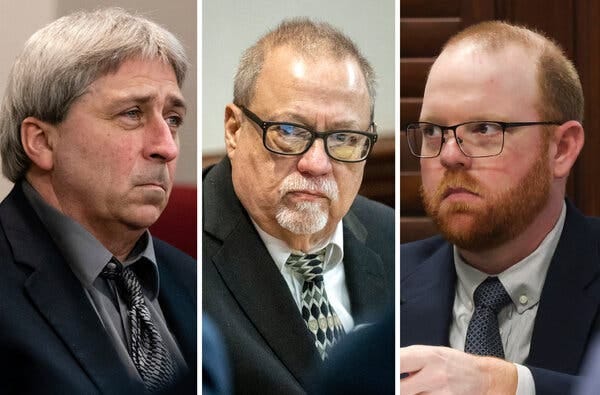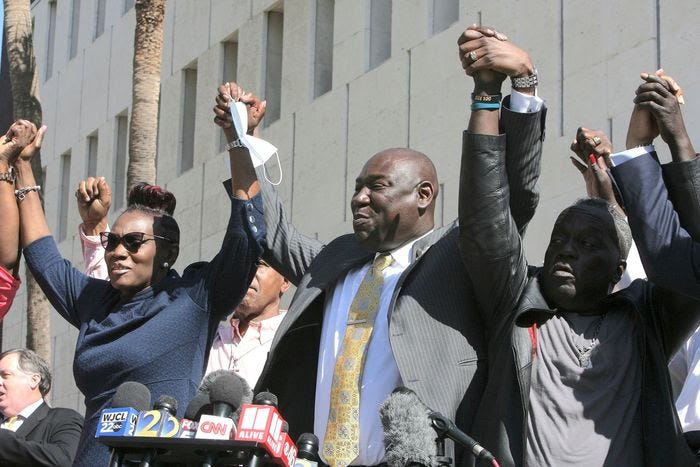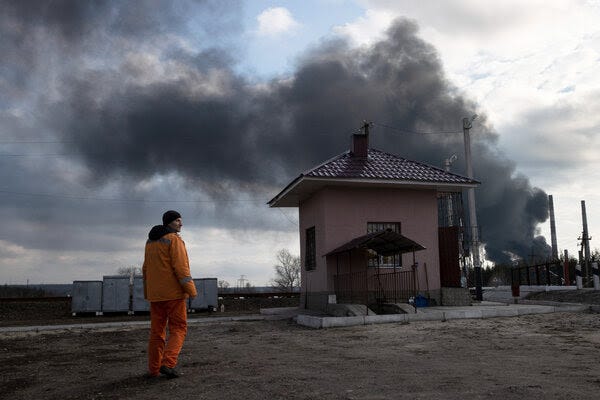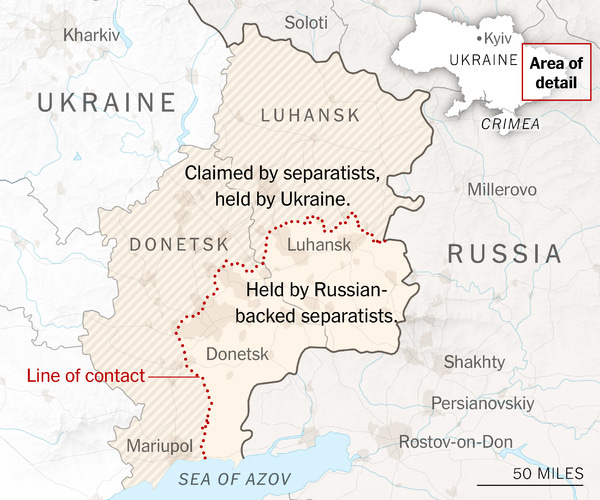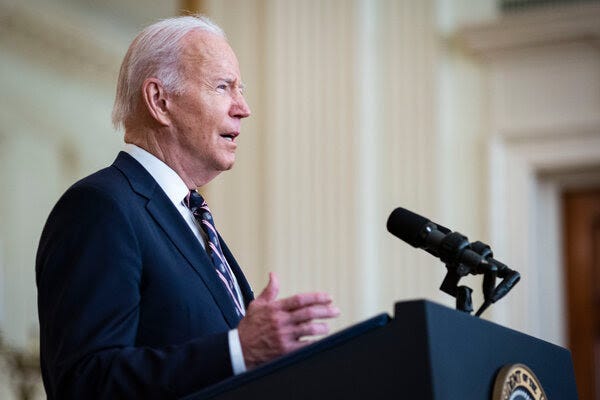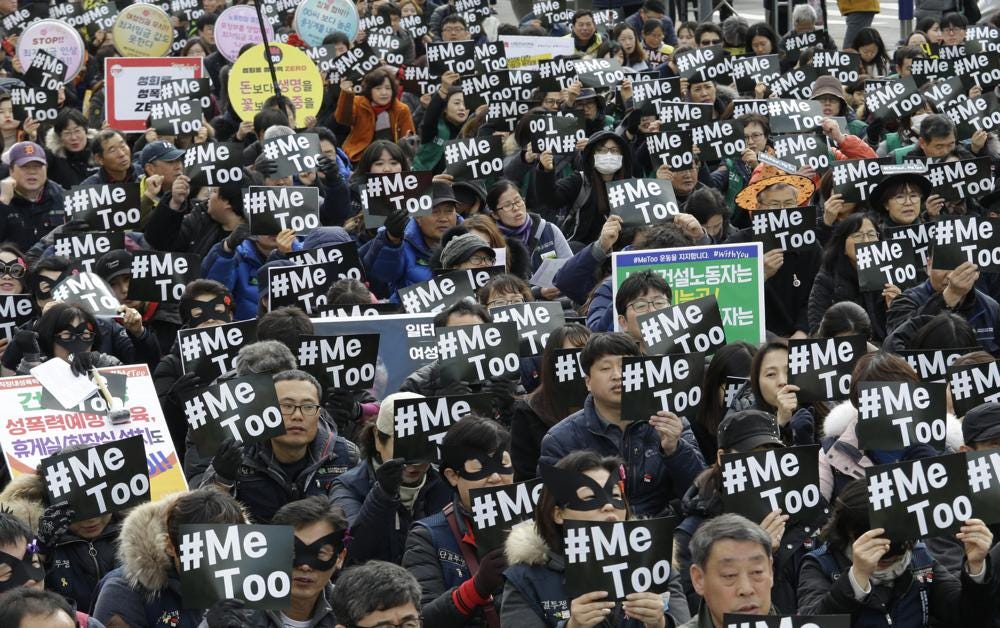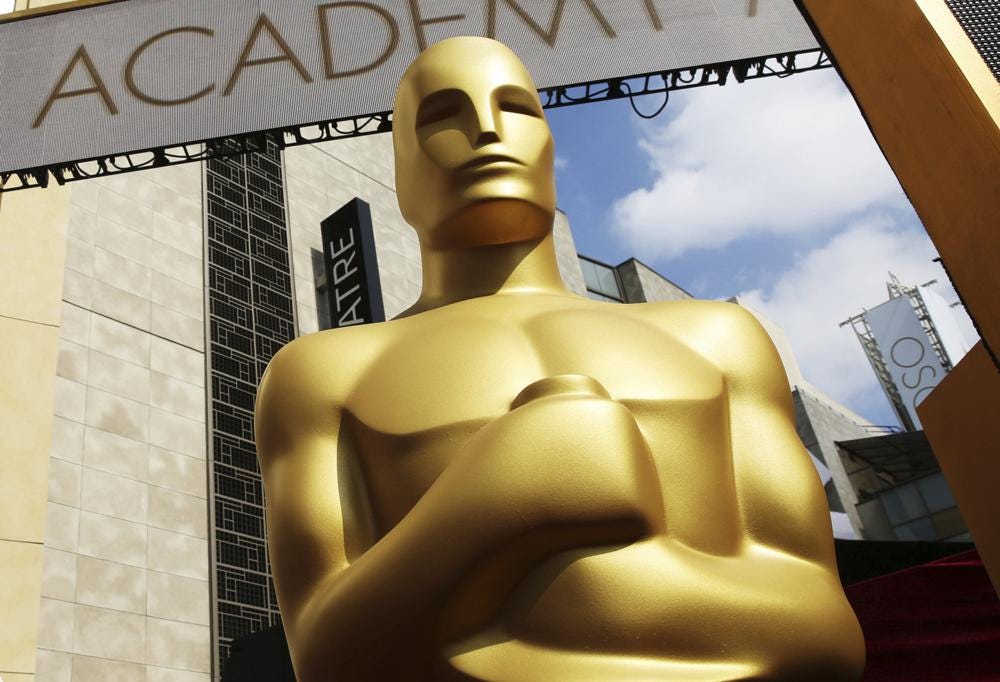The Full Belmonte, 2/23/2022
“WASHINGTON — The United States and its allies on Tuesday swiftly imposed economic sanctions on Russia for what President Biden denounced as the beginning of an ‘invasion of Ukraine, ‘unveiling a set of coordinated punishments as Western officials confirmed that Russian forces had begun crossing the Ukrainian border.
Speaking from the White House, Mr. Biden condemned President Vladimir V. Putin of Russia and said the immediate consequences for his aggression against Ukraine included the loss of a key natural gas pipeline and cutting off global financing to two Russian banks and a handful of the country’s elites.
‘Who in the Lord’s name does Putin think gives him the right to declare new so-called countries on territory that belonged to his neighbors?’ Mr. Biden said on Tuesday afternoon, joining a cascade of criticism from global leaders earlier in the day. ‘This is a flagrant violation of international law and demands a firm response from the international community.’
Mr. Biden warned Mr. Putin that more sanctions would follow if the Russian leader did not withdraw his forces and engage in diplomatic efforts to resolve the crisis.
But that prospect remained dim by the end of the day, as Secretary of State Antony J. Blinken canceled plans to meet with the Russian foreign minister on Thursday, saying that it does not ‘make sense’ to hold talks while Russian forces are on the move.
‘To put it simply, Russia just announced that it is carving out a big chunk of Ukraine,’ Mr. Biden said, adding, ‘He’s setting up a rationale to take more territory by force.’
The global response began early on Tuesday, just hours after Mr. Putin recognized the self-declared separatist states in eastern Ukraine and Russian forces started rolling into their territory, according to NATO, European Union and White House officials. It was the first major deployment of Russian troops across the internationally recognized border since the current crisis began.
At a news conference in Moscow, Mr. Putin said that he had not decided to send in troops ‘right at this moment.’ But officials said the invasion started overnight, just hours before Mr. Putin’s Parliament formally granted him the authority to deploy the military abroad. Ukrainians near the territory controlled by Kremlin-backed separatists have already endured days of shelling, and as Ukrainian troops hunkered down in their trenches and civilians took shelter in basements, the country’s military said that one soldier had been killed so far and six wounded.” Read more at New York Times
Screenshot: Fox News
President Biden warned today that Vladimir Putin is ‘carving out a big chunk in Ukraine’ and ‘setting up a rationale to go much farther,’ reports Axios World editor Dave Lawler.
‘Who in the Lord's name does Putin think gives him the right to declare new so-called countries in territories that belong to his neighbors?’ Biden asked.
Biden announced what he called the ‘first tranche’ in a series of stiff sanctions to punish Russia for invading Ukraine.
Two major Russian financial institutions will be put under sanctions.
Russia’s sovereign debt will be sanctioned so Russia ‘can no longer raise money from the West and cannot trade its new debt on our markets, or European markets either.’
Sanctions on Russian elites and their family members will be rolled out starting tomorrow, and the U.S. has stronger sanctions in store if Putin continues the invasion, Biden said.
Screenshot: MSNBC
The big picture: Putin gave his clearest indication yet that Russian troops would launch an invasion farther into Ukraine, saying the borders of the separatist ‘republics’ he recognized yesterday extend to territory currently controlled by Ukrainian forces.
Putin said at a press conference earlier today that Russian forces may not immediately advance into the two ‘republics,’ but that ‘it is impossible to predict the scenario that will unfold.’
Russia plans to evacuate its embassy in Kyiv.
NATO and the EU both said that Russian troops had crossed into the separatist republics in eastern Ukraine.” Read more at Axios
“Russia warned that Americans will fully feel the ‘consequences’ of U.S. sanctions on the Kremlin after it deployed troops into two pro-Moscow separatist regions of eastern Ukraine.
The West is bracing for Russia to retaliate against the measures, which Moscow said would hurt global financial and energy markets. President Biden acknowledged that the crisis could lead to higher gasoline prices, while U.S. businesses have been warned to prepare for possible cyberattacks.
European and Japanese officials have also expressed concerns about Moscow restricting energy and chipmaking supplies. A senior Russian official warned Tuesday that Germany, which has halted a major pipeline project with Moscow, would ‘very soon’ be paying more than double for natural gas.
Despite the possible repercussions, Biden has pledged more sanctions if Russia further invades Ukraine.” Read more at Washington Post
“Stocks dropped in a volatile trading session Tuesday that pushed the S&P 500 into correction territory as tensions in Eastern Europe escalated.
The broad stock market index closed down 1%, hitting its lowest level in more than four months, as investors digested the ramifications of Russia’s deployment of soldiers into Ukraine’s eastern Donbas region.
The threat of war has become the latest wild card for investors who were already concerned with supply-chain disruptions, rapidly rising inflation and central banks’ plans to tighten monetary policy.
The S&P 500 declined 44.11 points to 4304.76, leaving the index down more than 10% from its Jan. 3 high and marking its first correction since the onset of the Covid-19 pandemic in February 2020.” Read more at Wall Street Journal
“WASHINGTON — The Supreme Court agreed on Tuesday to hear an appeal from a Colorado web designer who objects to providing services for same-sex marriages, returning the justices to a battleground in the culture wars pitting claims of religious freedom against laws prohibiting discrimination on the basis of sexual orientation.
The court last considered the clash in 2018, when a similar dispute between a Colorado baker and a gay couple failed to yield a definitive ruling.
The precise question the justices agreed to decide in the new case is ‘whether applying a public-accommodation law to compel an artist to speak or stay silent violates the free speech clause of the First Amendment.’
The court will hear the case, 303 Creative LLC v. Elenis, No. 21-476, in its next term, which starts in October. It concerns Lorie Smith, who owns a website design company that says it serves gay customers but intends to limit its wedding-related services to celebrations of heterosexual unions. Ms. Smith has said she intends to post a message saying the company’s policy is a product of her religious convictions.
‘She cannot create websites that promote messages contrary to her faith, such as messages that condone violence or promote sexual immorality, abortion or same-sex marriage,’ Ms. Smith’s lawyers told the justices. ‘Lorie respectfully refers such requests to other website designers.’
A Colorado law forbids discrimination against gay people by businesses open to the public as well as statements announcing such discrimination. Ms. Smith, who has not begun the wedding business or posted the proposed statement for fear of running afoul of the law, sued to challenge it, saying it violated her rights to free speech and the free exercise of religion.
Philip J. Weiser, Colorado’s attorney general, told the justices that there was nothing concrete for the Supreme Court to decide. ‘The record contains no evidence,’ he wrote, ‘that anyone has asked the company to create a website for a same-sex wedding; that Colorado has threatened enforcement; or that any future wedding website would convey a message that would be attributed to the company.’
In any event, he wrote, the Colorado law was constitutional. ‘Antidiscrimination laws appropriately apply to prohibit commercial actors from discriminating in commercial transactions,” he wrote, “even though those commercial actors remain free to express their view on such laws in public discourse.’
‘Prohibiting companies from displaying what would amount to ‘Straight Couples Only’ messages is permissible,’ Mr. Weiser added, ‘because it restricts speech that proposes illegal activity and is therefore unprotected by the First Amendment.’” Read more at New York Times
“The Court also rejected former President Trump's latest request to block the National Archives and Records Administration from releasing records to the House Jan. 6 select committee.” Read more at Vox
“WASHINGTON — President Biden has interviewed at least three candidates for his Supreme Court nomination, a signal that he intends to fulfill his promise that he would choose a nominee by the end of the month.
But the end of the month is less than a week away. The interviews began late last week, according to several people familiar with the process, who spoke on condition of anonymity because of its political sensitivity. Mr. Biden is now under pressure to announce his selection, who he has promised will be a Black woman, somewhere between a rapidly devolving diplomatic effort to contain Russia’s aggression toward Ukraine and plans to deliver his first State of the Union address, scheduled for next Tuesday.
The White House emphasized on Tuesday that Mr. Biden had not made a decision but remained on track to make one before month’s end.
According to a person familiar with the process, Mr. Biden held interviews with three candidates who had long been seen as on his short list: He spoke with Judge Ketanji Brown Jackson, who won the support of three Republican senators when Mr. Biden elevated her to the U.S. Court of Appeals for the District of Columbia Circuit. He also interviewed Leondra R. Kruger of the California Supreme Court, a former law clerk on the Supreme Court whose Yale Law pedigree is shared by four of the current justices.
He also spoke with J. Michelle Childs, a Federal District Court judge in South Carolina, a state whose Black voters Mr. Biden has credited with helping him win the presidency.
At least one of the interviews was in person.
The White House, aware that a Supreme Court nomination is one of the most scrutinized and politically volatile of all presidential duties, has said so little about the process to replace the retiring Justice Stephen G. Breyer that the lack of details has become a running joke: ‘The long national process will soon be over,’ Jen Psaki, the White House press secretary, said wryly when a reporter asked if Mr. Biden had finished interviewing.” Read more at New York Times
“BRUNSWICK, Ga. — A jury on Tuesday found the three white Georgia men who murdered Ahmaud Arbery guilty of a federal hate crime, determining that they were motivated by racism when they chased the 25-year-old Black man through their neighborhood.
The case was one of the most high-profile hate crime trials in years, and came after a rash of acts of violence against African Americans, including Mr. Arbery and George Floyd, led to protests and soul-searching around the nation. It was seen as a victory for the Justice Department, which has pledged to make such cases a priority.
While legal analysts say that hate crimes are especially difficult to prove, federal prosecutors in the Georgia trial presented voluminous evidence of the defendants’ racist beliefs and crude language, leaving some jurors visibly shaken. It took them roughly four hours to reach a verdict. When it was read aloud in court, some jurors wept.
National civil rights leaders hailed the conviction as a victory for racial justice.
‘As the nation continues to grapple with racially motivated violence by police and vigilantes who shroud themselves in self-appointed authority, the jury sent a powerful message: We see you for what you are, and we will not tolerate your deadly campaign of intimidation,’ said Marc H. Morial, chief executive of the National Urban League. ‘This verdict draws a clear line in the sand.’” Read more at New York Times
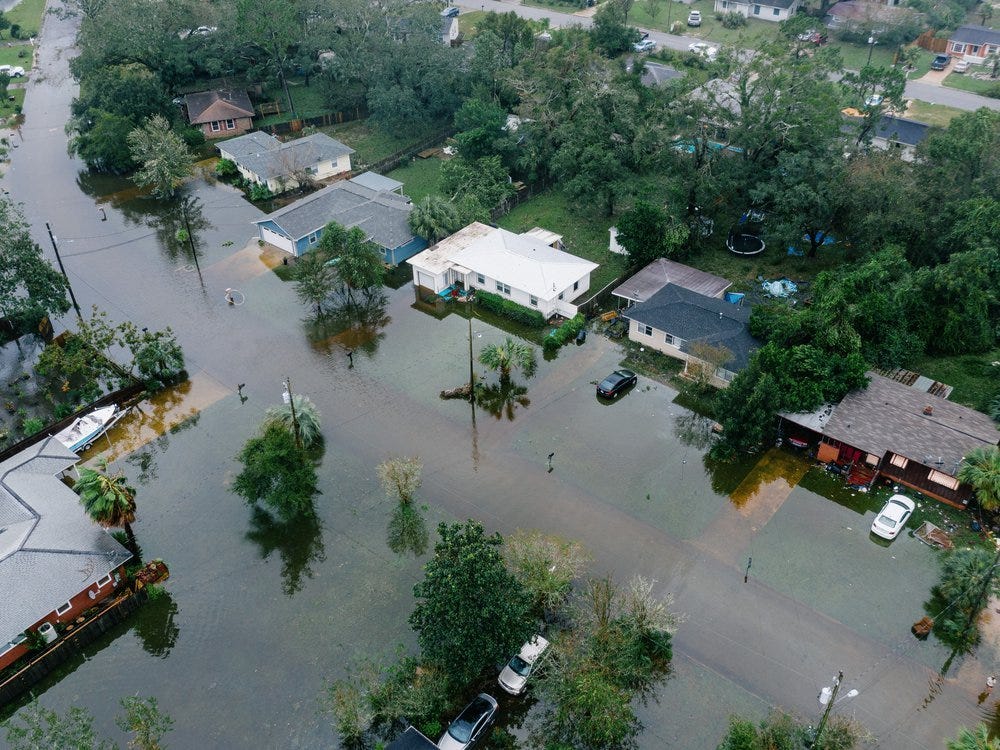
Several Gulf Coast cities including Pensacola, Florida suffered flooding from storm surges and heavy rainfall during Hurricane Sally in September 2020. The Washington Post via Getty Images
“Sea levels along United States coastlines will rise as much as one foot by 2050, according to a new report led by the National Oceanic and Atmospheric Administration (NOAA). Given how quickly the planet is warming due to human-caused climate change, scientists anticipate water will rise two feet by the end of the century.
‘The United States is expected to experience as much sea level rise in the next 30 years as we saw over the span of the last century,’ says Rick Spinrad, the NOAA administrator, at a news conference announcing the findings. ‘What we’re reporting out is historic.’
The report presents an alarming scenario for the roughly 127 million Americans that live in coastal counties. Flooding is expected to become more frequent and more damaging, and storm surges more intense. Sea level rise will also damage sensitive wetland ecosystems and increase erosion. By 2050, scientists expect moderate flooding to occur near coasts, on average, more than ten times as often as it does today.” Read more at Smithsonian
Lawyer Benjamin Crump is flanked by Ahmaud Arbery's parents, Wanda Cooper-Jones and Marcus Arbery, on Tuesday outside the federal courthouse in Brunswick, Ga.
PHOTO: LEWIS LEVINE/ASSOCIATED PRESS
“The GOP response to President Biden's State of the Union address will be delivered by Iowa Gov. Kim Reynolds.” Read more at Vox
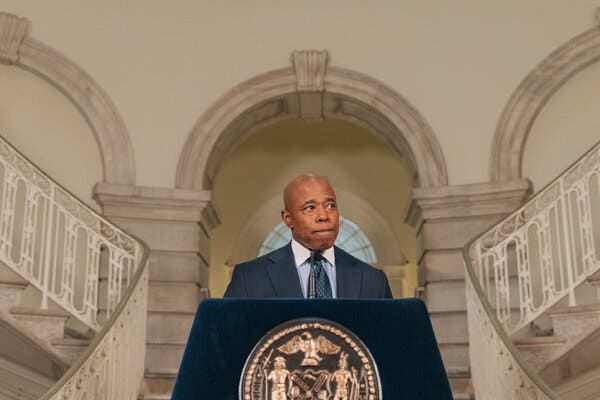
“In 2014, as Uganda was promulgating a law that made some homosexual behavior punishable by life in prison, a councilman from the Bronx traveled to the country and hailed its ‘godly’ governance.
‘Gay marriage is not accepted in this country,’ the councilman, Fernando Cabrera, said approvingly, sitting among palm trees in a video posted to YouTube. ‘Why? Because the Christians have assumed the place of decision-making for the nation. Abortions are illegal here, things that Christians really stand for.’
The video was subsequently removed from YouTube, but not before a gay rights activist and blogger, Andrés Duque, had downloaded it and reposted it online.
Now, eight years after his trip to Uganda, Mr. Cabrera’s embrace of a government that developed anti-gay laws at a time of anti-gay violence and even murder in the country is proving a political liability for Mayor Eric Adams, who recently named him to a position in his administration.
On Thursday afternoon, L.G.B.T.Q. groups are planning to gather on the steps of City Hall to protest Mr. Adams’s decision to name Mr. Cabrera and two other men who have voiced opposition to gay marriage to City Hall posts.
To gay and lesbian leaders, the appointments feel like a betrayal. The appointments also highlight another issue for the mayor — that his repeated controversial personnel decisions threaten to distract from the governance of a city still struggling to emerge from the pandemic amid a rise in violent crime.
Mr. Cabrera, who is no longer a councilman, has been named a senior adviser in the mayor’s newly created Office of Faith-Based and Community Partnerships, where he is set to work alongside Gilford Monrose, a Brooklyn pastor whom Mr. Adams has tapped to run the office and who has also voiced intolerance for homosexuality.
Mr. Adams has appointed Erick Salgado, another pastor who has expressed opposition to gay marriage, as an assistant commissioner for external affairs in the Mayor’s Office of Immigrant Affairs.
In a statement, Mr. Adams described himself as a ‘man of faith’ and said that he had always stood for ‘tolerance and inclusion.’
And speaking to reporters on Tuesday, Mr. Adams argued that ‘people evolve,’ touted his record ‘fighting on behalf of men and women of the L.G.B.T.Q. community’ and said that he was hiring the ‘best people’ for the job.
Asked about leaders who have criticized the appointments, Mr. Adams said he told them, ‘I respect your thoughts, but I’m going to do what is best for the City of New York.’
On Monday, the City Council’s L.G.B.T.Q. Caucus denounced Mr. Cabrera as a ‘bigot’ and said it opposed the appointments of both Mr. Cabrera and Mr. Salgado.
Mr. Adams’s hiring practices are all the more surprising, his critics say, because he himself voted to legalize same-sex marriage in the New York State Senate twice, even delivering a nine-minute speech in support of it in 2009. His spokesman also noted that when the mayor was Brooklyn borough president, he helped fund a permanent home for the Brooklyn Community Pride Center.” Read more at New York Times
“The Biden administration on Tuesday said it found ‘significant deficiencies’ in a Trump-era environmental analysis of a mining road that would cut through wilderness and Indigenous territory in northwest Alaska.
The construction of Ambler Road is one of the most high-profile environmental issues in Alaska, as it would bring 211 miles of new road through one of the largest roadless areas in the country.
The Interior Department said in a statement that the road proposal — which includes about 50 miles of Bureau of Land Management and National Park Service land — would cross the traditional homelands of Alaska Native communities including the Koyukon, Tanana Athabascans and Iñupiat peoples.
In a federal court filing Tuesday, the administration asked the U.S. District Court for Alaska to send the permit approval back to the department so it can conduct a new environmental analysis. Interior said that it would suspend the right of way for the road while it carried out the new assessment ‘to ensure that no ground-disturbing activity takes place that could potentially impact the resources in question.’” Read more at Washington Post
“A federal judge on Tuesday dismissed a lawsuit challenging legislative redistricting in Arkansas, in a case that could open up a new battle over the scope of federal protections for voting rights.
U.S. District Judge Lee Rudofsky dismissed a case brought by the American Civil Liberties Union, on behalf of the Arkansas NAACP, that claimed the redistricting map for the Arkansas State House of Representatives unlawfully watered down the voting strength of Black Arkansans by carving out too few majority-Black districts.
The new districts, the suit claimed, violated a key Voting Rights Act provision—known as Section 2—that forbids states from imposing discriminatory voting rules and procedures.
Judge Rudofsky, a President Donald Trump appointee, didn’t rule on the merits of the case. Instead, he said last week that he believed Congress never intended to give private parties the ability to bring lawsuits under Section 2.
The’“text and structure’ of the Voting Rights Act, he wrote in a Feb. 17 order, ‘strongly suggest that exclusive enforcement authority resides in the Attorney General of the United States.’
Until Judge Rudofsky’s order, no federal judge had categorically closed the door to Section 2 lawsuits brought by private plaintiffs.
Before dismissing the lawsuit, the judge gave the Justice Department five days to decide whether to join the case as a plaintiff. In a brief filing Tuesday, the department said it wasn’t taking action for now, but reiterated arguments it has made previously that private parties do have a right to sue.
After the Justice Department filing, the judge issued his dismissal, which the ACLU said it intends to appeal.
Civil-rights groups have for decades used Section 2 as a vehicle for challenging everything from redistricting maps to voter registration restrictions and voter ID rules, expanding enforcement of the law beyond the Justice Department.
Conservative states have faced more Section 2 lawsuits since the Supreme Court’s 2013 decision in Shelby County v. Holder effectively invalidated another part of the Voting Rights Act that required some states and other jurisdictions to clear any changes in their voting rules with the Justice Department.
The Supreme Court has previously assumed that citizens have a private cause of action to enforce their rights under Section 2. But it has never definitively decided the question.
The court examined Section 2 when it upheld a pair of Arizona voting rules last year against Democratic claims of voter discrimination.
That ruling, which raised the bar for proving claims that a state discriminated against minority voters, didn’t address the question of who can sue under the law. Justice Neil Gorsuch, however, in a concurring opinion described the issue as an ‘open question.’
Judge Rudofsky cited Justice Gorsuch in the Arkansas ruling.” Read more at Wall Street Journal
A power station in Luhansk, Ukraine, after being bombed.Tyler Hicks/The New York Times
Sanctions 2.0
“Eight years ago, after Russia annexed Ukraine’s Crimean Peninsula, the U.S. and its allies harshly condemned the invasion and imposed economic sanctions on Russia.
It barely seemed to matter.
Russia still controls Crimea. Russia’s economy, after going through a recession, soon started growing again. President Vladimir Putin remains firmly in control of his government — and has now begun another invasion, this time of eastern Ukraine.
In response, President Biden yesterday announced a new set of sanctions, imposed in tandem with Britain and the European Union. Putin’s aggression, Biden said, is ‘a flagrant violation of international law, and it demands a firm response from the international community.’ Biden also signaled that more sanctions may follow.
The obvious question is whether these sanctions will be any more effective than the earlier ones. Today’s newsletter lays out the possibilities.
By The New York Times
Targeted and weak
The 2014 sanctions against Russia did have some effect — arguably more than many people have realized. They made it harder for Russian banks to obtain foreign loans and restricted Western companies from working with Russian oil companies, among other steps.
By the summer of 2014, Russia’s economy was shrinking, and it continued shrinking for two years. The value of the ruble plunged on global markets, increasing the price of many goods for companies and consumers. Russian businesses had a harder time raising money for new projects.
These economic problems seem to have softened Putin’s domestic support. His approval rating among Russians initially surged after the Crimea invasion — to around 80 percent — before falling. It has hovered between 60 percent and 65 percent for much of the past two years, according to the Levada Center. Last year, opposition groups held some of the largest protests of Putin’s nearly two decades in power.
The sanctions might even have been painful enough to have deterred Putin from invading eastern Ukraine in 2014, which he seemed to be planning, as Anders Aslund and Maria Snegovaya have argued in an Atlantic Council report.
Still, the sanctions clearly did not reorder Russian politics. Putin, after all, moved to claim eastern Ukraine this week. Experts say that the sanctions’ limited effect is not surprising, because they were less ambitious than the sanctions the U.S. has imposed on other countries that have flouted global rules, like Iran, North Korea and Venezuela.
Russian howitzers outside Taganrog, Russia, yesterday.The New York Times
‘In 2014, when Putin invaded Ukraine the first time and annexed Crimea, the West acted too slowly and timidly initially,’ Michael McFaul, the U.S. ambassador to Russia from 2012 to 2014, told me yesterday.
One reason is that the 2014 sanctions were the product of negotiations with European countries that wanted to be more cautious than the U.S. The sanctions were also intentionally narrow, designed to hurt sectors of the economy with close ties to Putin’s regime while minimizing the effect on most Russians and on the global economy.
The reality is that for sanctions to have big political repercussions, they often need to be harsh. ‘Smart’ or ‘targeted’ sanctions won’t work,’ Edward Fishman and Chris Miller, two international-relations experts, recently wrote in Politico. ‘To really impose pain on Russia, the U.S. and Europe will have to bear some burden, too — although, fortunately, there are ways to minimize the fallout for Western economies.’
Biden acknowledged as much in his remarks at the White House yesterday. ‘Defending freedom will have costs, for us as well and here at home,’ he said. ‘We need to be honest about that.’ He added that he would take steps intended to minimize the increase in gas prices.
This is the approach that the U.S. took toward Iran more than a decade ago. It imposed tough sanctions, despite their likely effect on world oil markets and the damage to Iranians’ living standards. Those sanctions helped push Iran’s regime to negotiate over its nuclear program.
In Russia’s case, a more aggressive set of sanctions would start with a refusal to buy its oil — by far Russia’s biggest revenue source — perhaps phased in to mitigate the price increases on global markets. It could also involve restricting exports to Russia, like automobile parts and computers, or forbidding other banks from working with Russian banks.
Russia would still have access to parts of the global economy, especially if China continued working with it. But the effect could nonetheless be substantial, because Russia’s economy is now quite integrated with the European and U.S. economies.
President Biden announcing sanctions against Russia.Al Drago for The New York Times
More to come?
Which path are Biden and the E.U. choosing?
For now, they have imposed sanctions that Biden said went beyond the 2014 sanctions while still falling well short of what the U.S. and Europe could impose. The measures include blocking Russia’s government from borrowing money in Western financial markets and cutting off two large Russian banks from the U.S. financial system.
(My colleague Edward Wong has more details here. And Peter Coy of Times Opinion has written that isolating banks can be an effective tool.)
In the short term, those sanctions will almost certainly not cause Putin to stop menacing Ukraine. ‘Russia right now is sitting on quite a pile of extra cash,’ Melissa Eddy, a Times correspondent in Berlin, told my colleague Claire Moses. ‘They have a war chest.’
But there are two big uncertainties: whether the sanctions hurt Russia’s economy once that war chest is drawn down; and whether the U.S. and Europe will impose tougher sanctions if Putin continues his war.
‘The U.S. and the E.U. have worked hard over eight weeks to pull together what would be a serious, painful, massive package of sanctions that is designed to hurt,’ Steven Erlanger, The Times’s chief diplomatic correspondent in Europe, told us. They have not yet enacted all of those potential sanctions. But yesterday’s announcement, Steven added, ‘gives them room to hit Putin harder if he does more.’
Biden vowed yesterday to follow that strategy: ‘If Russia goes further with this invasion,’ he said, ‘we stand prepared to go further.’” Read more at New York Times
“OTTAWA — With the capital’s streets cleared of the heavy trucks and cars that made some of them impassable for three long weeks of protest, Canadian authorities said Tuesday that they were lifting freezes on hundreds of bank accounts associated with protest organizers and Canadians who had blockaded Ottawa’s streets with their vehicles.
Isabelle Jacques, an assistant deputy minister in Canada’s department of finance, told a House of Commons committee that the banks had begun unlocking accounts on Monday and that no more finances would be locked up.
‘The vast majority of assets are in the process of being unfrozen,’ she said.
When Prime Minister Justin Trudeau decided a week ago to invoke his country’s Emergencies Act for the first time in Canadian history to quell the unrest, it gave the police sweeping new powers to go after the finances of the protesters.
Ms. Jacques said that those measures are now being lifted because they were intended to pressure protesters to leave the city’s streets.” Read more at New York Times
“SEOUL, South Korea (AP) — As South Korea enters a bitter presidential race, Hong Hee-jin is one of many young women who feel that the country’s politics has become dominated by discrimination against women, even outright misogyny.
‘Women are being treated like they don’t even have voting rights,’ the 27-year-old office worker in the capital, Seoul, said.
For years, South Korean women have made slow but steady progress in the workplace as they confronted an entrenched culture of male chauvinism and harassment. But this extremely tight presidential race, which culminates March 9, has exposed the fragility of what’s been won.
Top conservative candidate Yoon Suk Yeol and his liberal rival Lee Jae-myung — both men above 55 — are fighting for what they see as a ‘male’ vote crucial for victory. They have increasingly focused their messages on young men who decry gender equality policies and the loss of traditional privileges in a hyper-competitive job market.
‘Politicians are taking the easy path,’ Hong said. ‘Instead of coming up with real policies to solve problems facing young people, they are fanning gender conflicts, telling men in their 20s that their difficulties stem from women receiving too many benefits.’
The tensions can be seen on the streets. Hundreds of women have marched in protest against the ‘election of misogyny.’ Small but vocal groups of anti-feminist men have staged rallies in response.
Divisive gender politics has grown as South Korea deals with a fast-aging population, a plummeting birth rate, soaring personal debt, a decaying job market and stark inequality. There’s also the growing nuclear threat from North Korea and fears of being squeezed in the confrontation between the United States and China.
No campaign issue, however, has caused more debate than Yoon’s vow to abolish the Ministry of Gender Equality and Family, which the candidate says promotes policies unfair to men.
A former prosecutor general, Yoon, 61, has also vowed stronger penalties for false sexual crime reports. Critics say this makes up only a small number of rape claims, and that the threat of tougher punishment could intimidate victims from coming forward amid a recent male backlash against the #MeToo movement.
Liberal ruling party candidate Lee, 57, has taken a cautious approach to gender issues, while clashing with Yoon over the economy and North Korea policy.” Read more at AP News
“WASHINGTON—The U.S. on Tuesday urged Canada to abandon its plan to impose a digital service tax on large businesses, warning that Washington would examine all options under bilateral trade agreements and domestic law to retaliate if such a levy is adopted.
The Office of the U.S. Trade Representative said it has filed comments with the Canadian government raising ‘serious concerns’ about Canada’s proposed plan to apply a 3% tax on certain revenue earned by large companies that provide digital services to Canadian users or sales of Canadian user data.
The U.S. also complained that the proposed plan singles out American companies for taxation while effectively excluding Canadian firms engaged in similar businesses.
Canada plans to press ahead with the digital-services tax ‘to ensure Canadians’ interests are protected,’ a spokeswoman for Canadian Finance Minister Chrystia Freeland said. Ms. Freeland has discussed the proposed levy with U.S. Treasury Secretary Janet Yellen on several occasions, the spokeswoman said, adding that Canada hopes that a proposed global tax arrangement for digital services will make Canada’s tax unnecessary.” Read more at Wall Street Journal
“SYDNEY, Australia — When Dr. Ken Coghill served in the Victoria state legislature in the early 1980s, he joined a movement to reform Australia’s campaign finance system, which allowed donations to slosh through politics, with donors mostly able to hide their identities and contributions.
Dr. Coghill, a Labor leader at the time, said he was outraged because the so-called dark money undermined the principle of all voters being equal, giving unidentified donors and their chosen candidates or parties “a very considerable advantage.”
Nearly 40 years later, Dr. Coghill is still outraged, because little has changed. But now, that culture of cashed-up secrecy is suddenly defining the start of the federal election campaign that will determine whether the current conservative prime minister remains in power.
With an election due by the end of May, Australians are not being treated to policy debates but rather accusations of shadowy Chinese financing, failures to report large donations, and payouts to climate-change warriors from coal barons.
‘The flow of money is increasing, but also the political culture is becoming eroded,’ said Han Aulby, executive director of the Center for Public Integrity. ‘There’s a sense that if you can get away with things, you do it.’
Compared with the United States, Australia’s campaign season is shorter and less costly, as is the case for many countries with parliamentary democracies. But even among its peers, such as Canada and New Zealand, Australia is a laggard on campaign finance regulation. Research from the Center for Public Integrity shows that over the past two decades, the source of nearly $1 billion in party income has been hidden.
Some scholars argue that Australia’s opacity reflects a distinct set of cultural idiosyncrasies: a belief that transparency is not an obvious social good and a sense that those in power should decide what the public needs to know.” Read more at New York Times
“Facebook Reels is now available to the platform’s global users. It’s the next move in the battle for video dominance with its short-video rival TikTok. Parent company Meta said video now accounts for more than half the time users spend on Facebook and Instagram. Meta introduced Reels in August 2020 to its Instagram users in the U.S. and to U.S. Facebook users in September 2021. Before today’s announcement, Facebook Reels was already available in Canada, Mexico and India, while Instagram Reels is available in most countries.” Read more at Wall Street Journal
“Phil Mickelson on Tuesday said he regretted his recent comments in support of a breakaway golf tour backed by Saudi Arabia and suggested he might take a leave from the golf course to ‘prioritize the ones I love most and work on being the man I want to be.’
‘I used words I sincerely regret that do not reflect my true feelings or intentions,’ Mickelson said in a statement. ‘It was reckless, I offended people and I am deeply sorry for my choice of words. I’m beyond disappointed and will make every effort to self-reflect and learn from this.’
A proposed Super Golf League, whose main source of funding is the Public Investment Fund of Saudi Arabia, a sovereign wealth fund worth more than $400 billion, has tried over the last year to lure prominent golfers like Mickelson away from the long-established PGA Tour.
In an interview for an unauthorized biography to be released in May, Mickelson told the journalist Alan Shipnuck, the book’s author, that he knew of the kingdom’s ‘horrible record on human rights,’ but said he was willing to help the new league because it was a ‘once-in-a-lifetime opportunity’ to dramatically increase the income of PGA Tour players.
In a story posted last week on The Firepit Collective, a golf website, Shipnuck quoted Mickelson, a six-time major golf champion, as saying the Saudi authorities were ‘scary’ and using a profanity to describe them. Mickelson also noted the murder of Jamal Khashoggi, the Washington Post journalist who was assassinated in 2018 with the approval of the kingdom’s crown prince, according to U.S. intelligence officials, and alluded to the criminalization of homosexuality in Saudi Arabia, where it is punishable by death.
Mickelson’s comments spurred a vociferous backlash from the highest-ranking players on the PGA Tour, almost all of whom have publicly rebuffed the new, alternative league. Rory McIlroy, a four-time major winner and one of the tour’s most respected players, called Mickelson’s remarks, ‘naïve, selfish, egotistical, ignorant.’
McIlroy’s contemporaries, a younger breed that now represents professional golf’s hierarchy, were similarly dismissive of the comments attributed to Mickelson, who is 51.
‘I don’t do this for the money, which to me is the only appeal to go over there,’ Jon Rahm, 27, said of the upstart Super Golf League. Added Rahm, who is atop the men’s golf rankings: ‘They throw numbers at you that’s supposed to impress people. I’m in this game for the love of golf and the love of the game and to become a champion.’
Mickelson’s longtime rival Tiger Woods also professed his fealty to the PGA Tour, which is based in America. And Mickelson’s comments may have fostered even more support for it as two more top golfers, Dustin Johnson and Bryson DeChambeau — both of whom had been noncommittal about the new league — announced that they were sticking with the tour.
Late Tuesday afternoon, KPMG, a professional services firm and a longstanding Mickelson sponsor, announced that it would end its relationship with Mickelson effective immediately.
Mickelson’s statement on Tuesday could be an attempt to ward off a possible suspension from the tour. He said his actions had always ‘been with the best interest of golf, my peers, sponsors and fans.’
He also implied that his remarks were ‘off-record comments being shared out of context and without my consent.’
Minutes after Mickelson released his statement, Shipnuck, on Twitter, called Mickelson’s contention that his comments had been off the record ‘completely false.’” Read more at New York Times
“NEW YORK (AP) — To combat slumping ratings, the Oscars are undergoing a radical slimming down, with eight awards to be presented off-air during next month’s telecast of the 94th Academy Awards.
In a letter sent Tuesday to members of the Academy of Motion Pictures Arts and Sciences, the group’s president, David Rubin, said that the awards for film editing, production design, sound, makeup and hairstyling, music (original score) and the three short film awards (documentary, live-action and animated) will be presented at the ceremony before the March 27 live broadcast begins on ABC.
Now, instead of starting the ceremony and broadcast all at once, the Dolby Theatre ceremony will begin an hour before the telecast does. The presentation and speeches of those early eight winners will be edited and featured during the three-hour live broadcast, which Rubin emphasized would still provide each winner with their ‘Oscar moment.’” Read more at AP News
“Lives Lived: Mark Lanegan was a singer for Screaming Trees and Queens of the Stone Age and an integral part of the 1980s and ‘90s grunge scene in the Pacific Northwest. He died at 57.” Read more at New York Times




